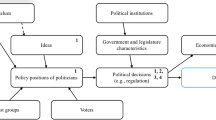Abstract
Empirical evidence offered in this study suggests that decisions by state government officials to effect debt-financed spending depend in part on the state's gubernatorial election cycle. More specifically, the results reveal relative increases in state debt issues in anticipation of elections, and furthermore, they reveal that such increases are more significant for states characterized by high interparty political competition. While theoretical limitations preclude a definitive explanation for these results, the evidence is consistent with a view of state political markets where incumbent parties manipulate public policy so as to enhance the probability of success in pending elections. This insight is significant in that it suggests a relationship between public policy decisions and election cycles in a context heretofore unexplored.
Similar content being viewed by others
REFERENCES
Bennett, J.T., and Dilorenzo, T.J. (1982). Off-budget activities of local government: The bane of the tax revolt.Public Choice 39: 333–342.
Bureau of the Census (1970–1980).State government finances. Washington, D.C.: U. S. Government Printing Offices.
Council of State Governments (1978–1979).Book of the states, Volume 22. Lexington, Ky.
Council of State Government (1980).Inventory of current state government accounting practices. Lexington, Ky.
Frey, B.S. (1978). Politico-economic models and cycles.Journal of Public Economics 9: 203–220.
Frey, B.S., and Schneider, F. (1978). An empirical study of politico-economic interaction in the United States.The Review of Economics and Statistics 60: 174–183.
Dawson, R.E., and Robinson, J.A. (1963). Inter-party competition, economic variables, and welfare policies in the States.Journal of Politics 2: 265–289.
Gold, S.D., (1983). Recent developments in state finances.National Tax Journal 36–1, 1–29.
Musgrave, R.A., and Musgrave, P.B. (1980).Public finance in theory and practice. New York: McGraw-Hill.
Nordhaus, W.D. (1975). The political business cycle.Review of Economic Studies 42: 169–190.
Paldam, M. (1981). An essay on the rationality of economic policy: The test-case of the electional cycle.Public Choice 37 (2): 287–305.
Peltzman, S. (1976). Toward a more general theory of regulation.Journal of Law and Economics 19: 211–240.
Petersen, J.E. (1978). State and local government debt policy and management. In J.E. Petersen, C.L. Spain and M.F. Laffey (Eds.),State and local government finance and financial management: A compendium of current research. Washington, D.C.: Government Finance Research Center.
Ranney, A. (1976). Parties in state politics. In H. Jacob and K.N. Vines (Eds.).Politics in the American States. Boston: Brown.
Sharkansky, I., and Hofferbert, R.I. (1969). Dimensions of state politics, economics, and public policy.American Political Science Review 63: 867–879.
Sherwood, H.C. (1976).How corporate and municipal debt is rated. New York: Wiley.
Stigler, G.J. (1971). The theory of economic regulation.Bell Journal of Economics and Management Science 2: 3–21.
Stigler, G.J. (1972). Economic competition and political competition.Public Choice 13: 91–106.
Thompkins, M.E. (1984). The electoral fortunes of gubernatorial incumbents: 1947–1981.Journal of Politics 46: 520–543.
Tufte, E.R. (1980).Political control of the economy. Princeton: Princeton University Press.
Wagner, R.E. (1977). Economic manipulation for political profit: Macroeconomic consequences and constitutional implications.Kyklos 30: 395–410.
Author information
Authors and Affiliations
Additional information
The authors thank John Evans, Nicholas Gonedes, John Hughes, Robert Ingram, William Keech, Wesley Magat, James Patton, Katherine Schipper, and George Stigler for their helpful comments. Prior versions of this manuscript were presented at the School of Business Administration, the University of California-Berkeley, at the School of Urban and Public Affairs, Carnegie-Mellon University and at the Wharton School, the University of Pennsylvania. Funding for this study was provided by the Columbia University Graduate School of Business.
Rights and permissions
About this article
Cite this article
Baber, W.R., Sen, P.K. The political process and the use of debt financing by state governments. Public Choice 48, 201–215 (1986). https://doi.org/10.1007/BF00051618
Issue Date:
DOI: https://doi.org/10.1007/BF00051618




